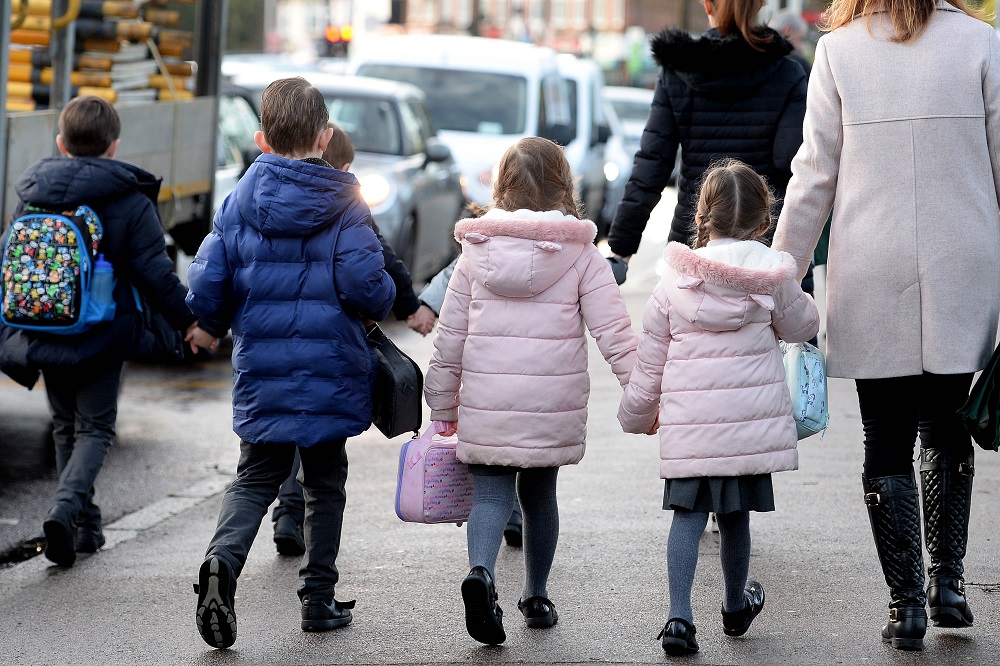Half of UK families with three or more children could end up in poverty says think tank

The wider benefits of scrapping the two-child limit such as savings to public services and the future earnings potential of young people who avoid poverty as a result are being ignored, says a think tank.
Prime Minister Sir Keir Starmer has faced pressure, including from some of his own Labour MPs, since being elected in July to scrap the controversial Conservative policy but has insisted he cannot do so in the current economic climate.
The New Economics Foundation (NEF) said its UK-wide analysis suggests that retaining both the two-child limit and the benefit cap – which a number of campaigners have said should also be axed – could see almost half (49.4%) of families with three or more children living in relative poverty after housing costs by the end of this Parliament five years from now.
Cost
Scrapping both the two-child limit and the benefit cap, from April 2025, could cost the Government £2.5 billion a year, rising to £3.5 billion by 2029/30, the organisation said.
Much of these costs are taken up by the two-child limit at £1.9 billion and £2.6 billion respectively, the NEF said, but it argued this would be “significantly offset by short, medium and longer-term economic gains”.
The report follows a similar analysis by the Institute for Fiscal Studies earlier this month which concluded lower costs, but the NEF said its report has gone beyond this to assess the potential wider benefits.
The think tank said the Office for Budget Responsibility (OBR) – which provides analysis of the UK’s public finances – is likely to be undervaluing potential benefits to the economy from the scrapping of both caps and said it should be setting out longer-term forecasts to take account of likely positive effects further down the line.
Barriers
Report author and senior NEF economist Sam Tims said: “Poverty is one of the greatest barriers that exists in terms of people achieving their potential. The more the Government can do to reduce poverty, the more that they will see the gains in the future from a better educated and a healthier workforce.”
He said a reduction in child poverty “would mean that the demand on the NHS, schools, police services and social services would ease”.
He added: “Because the OBR are ignoring them (wider benefits), the ambitions for the child poverty strategy are going to be limited if there isn’t a change in approach from the OBR and Government more widely.”
Savings
The NEF said its analysis suggested that the reduction in child poverty by the end of this Parliament from the axing of the two-child limit could see lower demand for public services of £1.5 billion a year over the medium term (five years).
In the longer term – across 20 or 25 years – children who would as a result avoid either poverty or deep poverty could have estimated future net earnings of £920 million a year higher, with an additional £490 million returned to government through taxation and reduced spending on social security, the NEF said.
The report stated: “To properly account for the effects of poverty reduction, a wider set of factors should be considered over a longer timeframe by the OBR.
“In reducing child poverty rates, pressures on the NHS, schools, and social services will reduce, enabling the reallocation of resources to other areas of high demand.
“Not all these gains will materialise straight away – the effects of poverty can be long-lasting – but they are currently ignored entirely in OBR forecasts.”
Poverty
Scrapping both the two-child limit and the benefits cap would reduce the economic cost of child poverty by a total of £4 billion a year by the end of this Parliament, the NEF said.
The report concludes that the child poverty strategy which the Government has committed to publishing in spring “will inevitably require a recommendation to end the two-child limit, with the detrimental contribution of the benefit cap on incomes and wellbeing at least significantly addressed”.
But the think tank said the Government should not wait until next year to scrap or change the policies.
The two-child limit was first announced in 2015 by the Conservatives and came into effect in 2017. It restricts child tax credit and universal credit to the first two children in most households.
The benefit cap, introduced in 2013 under the then-Conservative and Liberal Democrat coalition government, as a way of “restoring fairness to the welfare state”, sees the amount of benefits a household receives reduced to ensure claimants do not receive more than the cap limit.
Actions
A Government spokesperson said: “No child should be in poverty – that’s why our Ministerial Taskforce is looking at all available levers across government as it develops an ambitious strategy to tackle child poverty.
“Tackling child poverty is a core part of our mission to give everyone opportunity and grow the economy.
“Alongside extending the Household Support Fund to support struggling families this winter, we are also taking bold action to support people into work to spread opportunity and prosperity to all.”
Support our Nation today
For the price of a cup of coffee a month you can help us create an independent, not-for-profit, national news service for the people of Wales, by the people of Wales.





I’ve long been curious about the logic of justifying immigration on the basis that “there aren’t enough young people” whilst also enacting policies to discourage having children (and indeed, to actively make the lives of families with many children worse). And then talking heads complain about people invoking conspiracy theories to explain the contradiction.